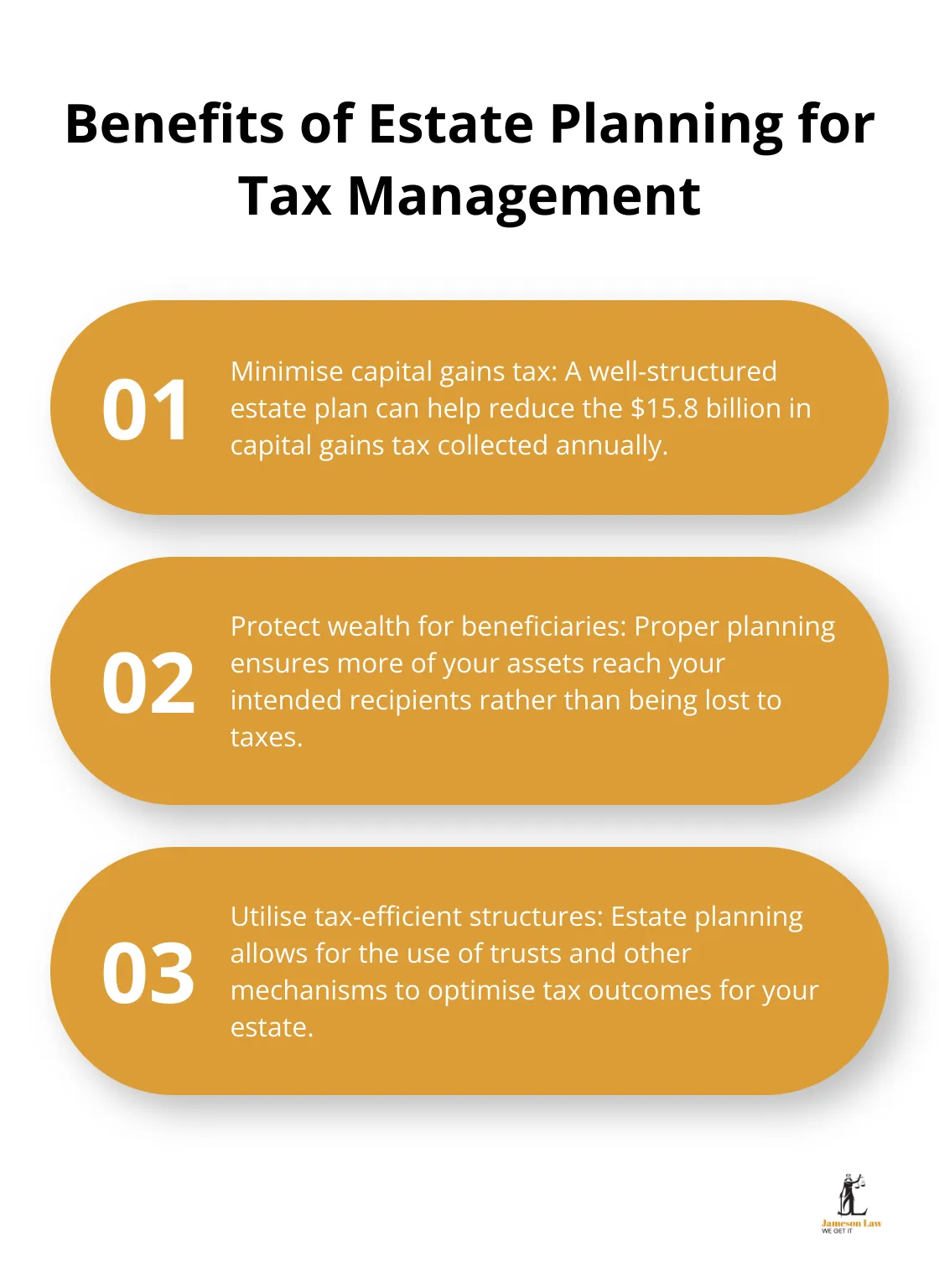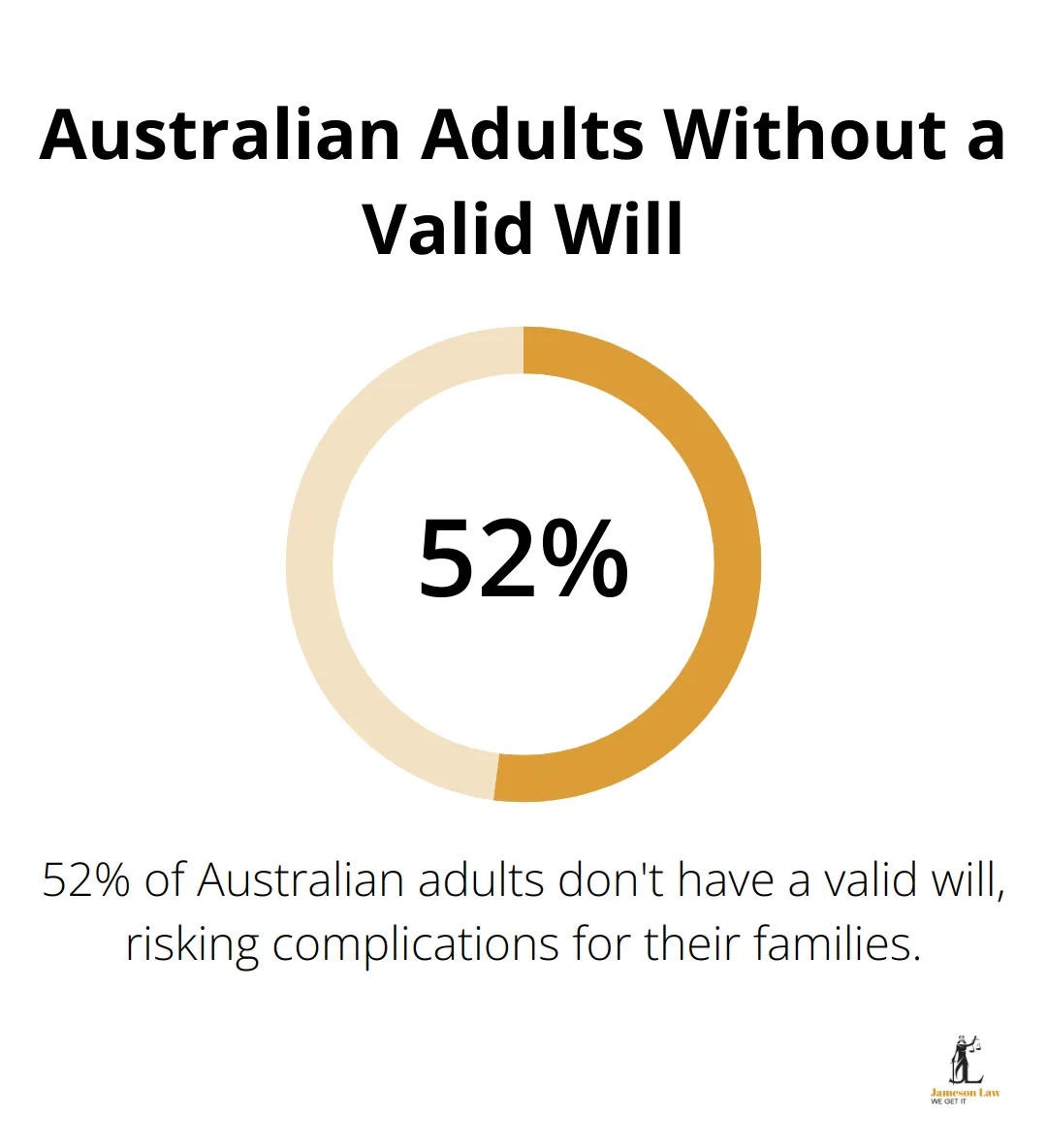Estate planning is a crucial process that often gets overlooked. At Jameson Law, we frequently encounter clients who are unsure about what estate planning entails and why it’s so important.
This comprehensive guide will answer the question “What is estate planning?” and explore its significance in protecting your assets and loved ones. We’ll also delve into the key components of an effective estate plan and provide practical advice to help you get started.
What Is Estate Planning?
Definition and Purpose
Estate planning is the process of arranging how your assets will be managed and distributed after your death or in case of incapacity. It’s a vital step in securing your financial legacy and ensuring your wishes are carried out. This process involves creating a set of legally binding documents that outline your intentions for your assets, healthcare decisions, and the care of your dependents.
Key Components of an Estate Plan
An effective estate plan typically includes several key components:
- Will: The cornerstone of any estate plan, detailing how you want your assets distributed after your death.
- Trusts: Used to manage assets, potentially reduce taxes, and provide for beneficiaries according to specific terms.
- Power of Attorney: Designates someone to make financial or medical decisions on your behalf if you become incapacitated.
- Advance Healthcare Directive: Also known as a living will, outlines your preferences for medical treatment in end-of-life situations.
Who Needs Estate Planning?
Estate planning isn’t just for the wealthy or elderly. If you own assets, have dependents, or want control over your healthcare decisions, you need an estate plan. This includes:
- Young adults
- Parents with minor children
- Business owners
- Anyone with specific wishes for their assets or healthcare
For parents, estate planning is particularly important. It allows you to name guardians for your children and set up trusts to manage assets for their benefit. Business owners can use estate planning to ensure a smooth transition of their business interests.
Even if you don’t have substantial assets, an estate plan can save your loved ones from unnecessary stress and potential legal complications during an already difficult time. According to research, only 22 per cent of those in the 75-84 years age group have a pre-paid funeral plan, indicating a significant gap in estate planning even among older Australians.

The Importance of Professional Guidance
Estate planning can be complex, and laws vary by state in Australia. It’s advisable to seek professional legal advice to ensure your estate plan is comprehensive and tailored to your unique situation. A qualified estate planning lawyer can help you navigate the intricacies of the law, minimise potential tax implications, and create a plan that truly reflects your wishes.
As we move forward, we’ll explore the numerous benefits of estate planning, which extend far beyond simply distributing assets. These advantages highlight why estate planning should be a priority for every Australian, regardless of age or wealth.
Why Estate Planning Matters
Protecting Your Legacy
Estate planning empowers you to safeguard the wealth you’ve built over a lifetime. Without a robust plan, your assets could fall prey to unnecessary taxes, legal fees, and creditors’ claims. The Australian Taxation Office reported that in the 2019-2020 financial year, they collected over $15.8 billion in capital gains tax. A well-structured estate plan can help you minimise these tax implications, ensuring more of your wealth reaches your intended beneficiaries.

Caring for Your Loved Ones
One of the most compelling reasons to create an estate plan is to provide for your dependents and loved ones. This becomes particularly critical if you have minor children. Without proper planning, the court may decide who raises your children if something happens to you. An estate plan allows you to nominate guardians and establish trusts to manage assets for your children’s benefit.
Avoiding Family Disputes
Family conflicts over inheritances occur more frequently than you might think. A carefully crafted estate plan can help prevent these disputes by clearly outlining your wishes. It may also include provisions that discourage challenges to your will, preserving family relationships during emotionally charged times.
Maintaining Control Over Healthcare Decisions
Estate planning extends beyond financial matters. It also allows you to maintain control over your healthcare decisions if you become incapacitated. Through an advance care directive, you can specify your preferences for medical treatment in end-of-life situations. This spares your loved ones from making difficult decisions on your behalf and ensures your wishes are respected.
Streamlining the Transfer of Assets
A well-structured estate plan can significantly simplify the process of transferring assets to your beneficiaries. Without a plan, your estate may need to go through probate (a legal process that can be time-consuming and expensive). By using tools such as trusts, you can potentially bypass probate, allowing for a smoother and more private transfer of assets.
Estate planning serves as a powerful tool for protecting your assets, providing for your loved ones, and ensuring respect for your final wishes. The next section will explore the essential documents that form the backbone of a comprehensive estate plan, equipping you with the knowledge to start your estate planning journey.
Key Documents for Effective Estate Planning
The Foundation: Your Will
A will forms the cornerstone of any estate plan. It outlines how you want your assets distributed after your death and can specify guardians for minor children. New research reveals that 52% of Australian adults don’t have a valid will. This oversight can lead to significant complications for families and potential disputes over asset distribution.

Your will should be clear, comprehensive, and updated regularly to reflect major life changes (such as marriages, divorces, or the birth of children). It’s also wise to include a residuary clause to cover any assets not specifically mentioned.
Power of Attorney: Your Voice When You Can’t Speak
A power of attorney (POA) is a legal document that allows someone you trust to make decisions on your behalf if you become incapacitated. There are two main types:
- Financial POA: Gives authority to manage your financial affairs.
- Medical POA: Allows someone to make healthcare decisions for you.
In Australia, the specific terms and requirements for POAs vary by state. For instance, in New South Wales, an enduring power of attorney covers financial matters, while an enduring guardianship addresses medical and lifestyle decisions.
Advance Care Directive: Your Healthcare Wishes
An advance care directive (also known as a living will) outlines your preferences for medical treatment in end-of-life situations. This document can provide clear guidance to your family and medical professionals about your wishes regarding life-sustaining treatments, pain management, and organ donation.
Recent data shows that more than one in two Australians will be unable to make their own decisions about medical care at the end of their lives, yet only 15% have an advance care directive. Creating this document ensures your healthcare wishes are respected and relieves your loved ones of the burden of making difficult decisions during emotionally challenging times.
Trust Documents: Protecting and Managing Assets
Trusts can be valuable tools in estate planning, offering benefits such as asset protection, tax minimisation, and control over asset distribution. Common types of trusts in Australia include:
- Testamentary Trusts: Created within a will and come into effect after death.
- Discretionary Trusts: Provide flexibility in distributing assets to beneficiaries.
- Special Disability Trusts: Designed to provide for the care and accommodation needs of a person with a severe disability.
Beneficiary Designations: Ensuring Proper Asset Transfer
Certain assets, such as superannuation and life insurance policies, are typically distributed outside of your will. It’s important to keep your beneficiary designations up-to-date for these assets. If you don’t nominate a beneficiary, your fund may not know who your benefit should be paid to. In these cases, they will follow the law.
Final Thoughts
Estate planning protects your legacy and safeguards your loved ones. A comprehensive estate plan gives you control over your assets, healthcare decisions, and your dependents’ future wellbeing. Professional legal advice helps navigate the complexities of estate planning, as each individual’s circumstances require a tailored approach.
We at Jameson Law understand the importance of answering “What is estate planning?” and can guide you through every step. Our experienced team creates comprehensive plans that address your unique needs and ensure your wishes are carried out. Estate planning provides peace of mind, knowing you’ve taken steps to secure your legacy and care for those who matter most.
Don’t postpone estate planning until it’s too late. Start the process today to protect your assets, respect your healthcare wishes, and provide for your loved ones. Contact us to learn more about what estate planning can do for you and your family.













